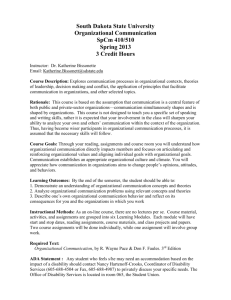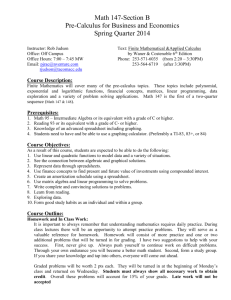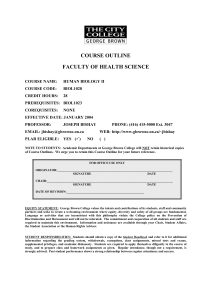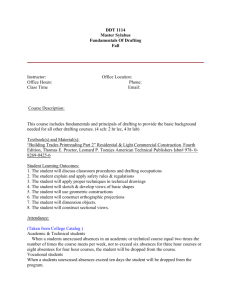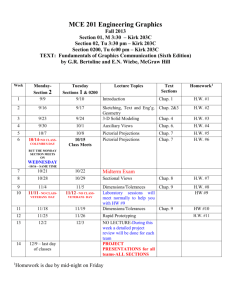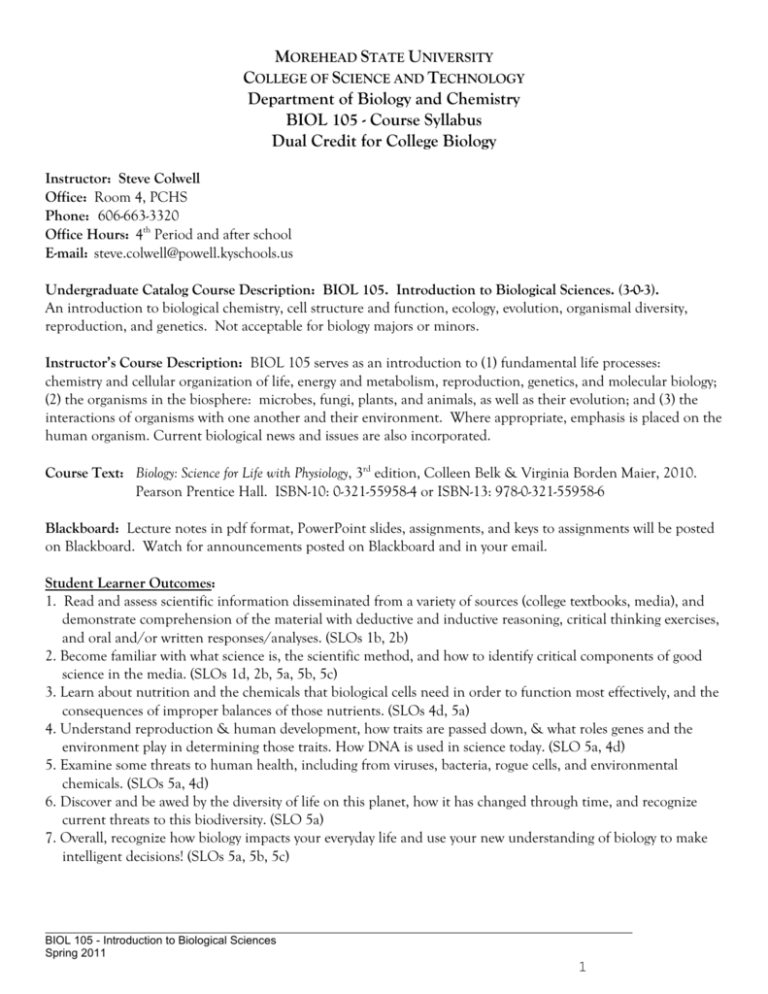
MOREHEAD STATE UNIVERSITY
COLLEGE OF SCIENCE AND TECHNOLOGY
Department of Biology and Chemistry
BIOL 105 - Course Syllabus
Dual Credit for College Biology
Instructor: Steve Colwell
Office: Room 4, PCHS
Phone: 606-663-3320
Office Hours: 4th Period and after school
E-mail: steve.colwell@powell.kyschools.us
Undergraduate Catalog Course Description: BIOL 105. Introduction to Biological Sciences. (3-0-3).
An introduction to biological chemistry, cell structure and function, ecology, evolution, organismal diversity,
reproduction, and genetics. Not acceptable for biology majors or minors.
Instructor’s Course Description: BIOL 105 serves as an introduction to (1) fundamental life processes:
chemistry and cellular organization of life, energy and metabolism, reproduction, genetics, and molecular biology;
(2) the organisms in the biosphere: microbes, fungi, plants, and animals, as well as their evolution; and (3) the
interactions of organisms with one another and their environment. Where appropriate, emphasis is placed on the
human organism. Current biological news and issues are also incorporated.
Course Text: Biology: Science for Life with Physiology, 3rd edition, Colleen Belk & Virginia Borden Maier, 2010.
Pearson Prentice Hall. ISBN-10: 0-321-55958-4 or ISBN-13: 978-0-321-55958-6
Blackboard: Lecture notes in pdf format, PowerPoint slides, assignments, and keys to assignments will be posted
on Blackboard. Watch for announcements posted on Blackboard and in your email.
Student Learner Outcomes:
1. Read and assess scientific information disseminated from a variety of sources (college textbooks, media), and
demonstrate comprehension of the material with deductive and inductive reasoning, critical thinking exercises,
and oral and/or written responses/analyses. (SLOs 1b, 2b)
2. Become familiar with what science is, the scientific method, and how to identify critical components of good
science in the media. (SLOs 1d, 2b, 5a, 5b, 5c)
3. Learn about nutrition and the chemicals that biological cells need in order to function most effectively, and the
consequences of improper balances of those nutrients. (SLOs 4d, 5a)
4. Understand reproduction & human development, how traits are passed down, & what roles genes and the
environment play in determining those traits. How DNA is used in science today. (SLO 5a, 4d)
5. Examine some threats to human health, including from viruses, bacteria, rogue cells, and environmental
chemicals. (SLOs 5a, 4d)
6. Discover and be awed by the diversity of life on this planet, how it has changed through time, and recognize
current threats to this biodiversity. (SLO 5a)
7. Overall, recognize how biology impacts your everyday life and use your new understanding of biology to make
intelligent decisions! (SLOs 5a, 5b, 5c)
BIOL 105 - Introduction to Biological Sciences
Spring 2011
1
~~~~~~~~~~~~~~~~~~~~~~~~~~~~~~~~~~~~~~~~~~~~~~~~~
Key for GENERAL EDUCATION Student Learner Outcomes (SLOs):
1b. Read college-level critical, creative, and technical texts for comprehension.
1d. Convey quantitative and qualitative relationships using symbols, equations, graphs, and tables.
2b. Recognize and effectively utilize both deductive and inductive reasoning.
4d. Comprehend the cycle of human growth necessary to provide sustained health & individual well-being.
5a. Comprehend and apply basic scientific, quantitative, and technological methods and knowledge of natural
systems to the solution of scientific problems.
5b. Employ scientific methods and theories to analyze and address open and debated questions in the sciences
5c. Analyze explanations to classify them as scientific or nonscientific.
Grading Policy: Your final grade will be based on exams, quizzes and assignments. Each exam, including the
final exam, is worth 100 percentage points and these exams will count for 80% of your grade. Exam questions are
primarily multiple- choice. The last exam is the final exam, and will contain new material and a comprehensive
component. Quizzes will cover assigned readings and class material. There will also be various in-class & out-ofclass assignments. These quizzes and assignments will be worth the remaining 20% of your grade. You must have
a valid excuse to make up any assignment or quiz that you miss, and it must be made up before the graded
assignment is returned and/or the key is posted on Blackboard or given to the class. The points from the exams,
quizzes and assignments will be averaged together (80% weight for the exams and 20% weight for the quizzes and
assignments )for the final grade. A missed exam, quiz or assignment will be recorded as a grade of zero.
Drop Date: The last day to drop this class and receive a grade of "W" is November 1.
Grading Scale:
90 - 100%
80 – 89%
70 – 79%
60 – 69%
< 60%
=A
=B
=C
=D
=E
CLASS POLICIES
Attendance Policy: Attendance is required. Role will be taken at each class meeting. Four (4) or more
unexcused absences are considered an excessive number of absences. This can hurt you if your average at the
end of the semester is “borderline”. The same is true for students who are chronically tardy or who leave early.
You are expected to be on time & participate for the entire class period.
Turning in late work: If there is an out-of-class assignment, it must be turned in on the due date specified by the
instructor. Points will be deducted if the assignment is turned in late. In-class assignments can not be made up,
unless the student provides a written valid excuse & the assignment can be done before it is returned to
students in class and/or the key is posted. The assignment must be done immediately upon the student’s
return. It is the student’s responsibility to contact the instructor about a missed assignment.
Exam Make-up Policy: If you miss an exam and need to take a make-up exam, you must have documented
evidence of a valid excuse, which includes personal illness or injury, family emergency, or a school-sponsored
activity. Acceptance of any other excuses will be at the instructor's discretion. Refer to University Administrative
Regulation (UAR) number 131.01 for more information regarding the university’s excused absences policy.
Proof of a valid excuse for missing an exam includes a signed note from a physician for an illness or injury, a
BIOL 105 - Introduction to Biological Sciences
Spring 2011
2
signed note from a MSU sponsor for a university sponsored event or field trip, or written evidence of a death in
the family. It is the student’s responsibility to contact the instructor about the absence. To be eligible to take a
make-up exam, YOU MUST NOTIFY ME BEFORE THE EXAM or WITHIN 1 DAY AFTER returning from
the absence. You must take the make-up exam within 7 calendar days of the missed exam, except in extreme
circumstances.
Extra credit assignments & opportunities may be available during class. You must attend class to get these
opportunities. If you miss class, you can not make up the extra credit assignment. Any extra credit assignments
turned in late will not be accepted for credit.
Classroom Behavior:
Students are expected to show respect to their fellow classmates and the instructor. Any disruptive
behavior will not be tolerated & the student will be asked to leave class.
Be on time for class.
Please use the restroom before coming to class. Students should remain in their seats during class,
unless it is an emergency. Students may not leave the classroom during an exam. If you are late on
exam day, you will not get extra time to take the exam.
No sleeping! I expect you to attend class in both mind and body.
Please do not carry on conversations during lecture.
Cell phones (including I phones & Blackberry’s) and other electronic devices (pagers, etc.) must be
turned off during class and put away out of sight. If you receive an audible page or phone call, the
phone will be confiscated and turned in to the office. Any devices requiring the use of headphones
(such as MP3 players or IPods) are not permitted in class.
No text messaging in class.
Any computer use in class should be for taking notes or accessing Biology 105 material. I will ask to
see your computer if you are using one. You will lose your privilege to use your laptop if you are using
your computer for anything other than course-related material. Keep the battery charged & do not use
power cords in class.
Computers, cell phones, IPods and other electronic devices cannot be used during exams, and should
be put away and turned off during the exam.
Please do not leave trash in the classroom. Recycling containers are provided in the hallways for
paper, aluminum cans and plastic.
Tutoring:
Study groups will be scheduled as needed throughout the semester. If you find yourself needing assistance,
please talk to your instructor.
Academic Dishonesty:
Cheating on quizzes or exams, fabrication, plagiarism or helping others to commit these acts will not be
tolerated. Academic dishonesty will result in severe disciplinary action including, but not limited to, failure of
the student assessment item or course (in other words, a grade of “zero”), and/or dismissal from MSU. All
cases of academic dishonesty will be reported to the administration. During an exam, only pencils, a Scantron
and the question sheet are allowed to be on or around your desk - no cell phones, papers, textbooks,
notebooks, etc. There should be no talking while the exams are being passed out or during the exam. If you
have a question during an exam, ask your instructor, not your neighbor. Plagiarism occurs when a student
uses ideas or wording from another source without appropriately referencing the source, or copies text wordfor-word, or close to it. Plagiarized material will result in a grade of zero. If you are not sure what constitutes
BIOL 105 - Introduction to Biological Sciences
Spring 2011
3
academic dishonesty, read The Eagle: Student Handbook or ask your instructor. The university’s policy on
academic dishonesty is located at http://www.moreheadstate.edu/dsl/eaglehandbook
Policy for Accommodating Students with Disabilities: In compliance with the Americans with Disabilities Act
(ADA), all students with a documented disability are entitled to reasonable accommodations and services to
support their academic success and safety. Professional staff from MSU Academic Services Center (ASC)
coordinate efforts to address accessibility needs and class accommodations with instructors of students who
have learning or physical disabilities. Faculty will cooperate with the ASC staff to accommodate the needs of
students taking departmental courses. Though a request for services may be made at any time, services are
best applied when they are requested at or before the start of the semester. To receive accommodations
and services the student should immediately contact the Disability Services Coordinator at: 204-E ADUC,
606-783-5188, or e.day@moreheadstate.edu.
Campus Safety Statement:
Emergency response information will be discussed in class. Students should familiarize themselves with the
nearest exit routes in the event evacuation becomes necessary. You should notify your instructor at the
beginning of the semester if you have special needs or will require assistance during an emergency evacuation.
Emergency response protocols are located at http://www.moreheadstate.edu/emergency
Use of Technology:
Students enrolled in BIOL 105 will be expected to use lecture notes, PowerPoint slides, and assignments
posted on Blackboard. Students are also expected to use software and other computer technology provided by
the textbook publisher.
BIOL 105 - Introduction to Biological Sciences
Spring 2011
4
1
2
3
4
5
6
7
8
9
10
11
12
13
14
15
16
17
18
19
20
21
22
23
24
25
26
27
28
29
30
31
32
33
34
35
36
37
38
PROPOSED LECTURE & EXAM SCHEDULE*
Anticipated Topic
Text Reference
Introduction to the Course
Exploring Science, Biology & Life
Chap. 2
The Scientific Method
Chap. 1
The Scientific Method
Chap. 1
Origin & Chemistry of Life
Chap. 2
Chemistry of Life
Chap. 2
Macromolecules & Nutrition
Chap. 2 & 3
Macromolecules & Nutrition
Chap. 2 & 3
EXAM 1 – date subject to change
Cell Structure
Chap. 2
Transport Across the Cell Membrane Chap. 3
Cell Structure & Diversity
Chap. 2, 12 & 18
Enzymes & Metabolism
Chap. 3
Photosynthesis
Chap. 4
Cellular Respiration
Chap. 4
Greenhouse Effect
& Global Warming
Chap. 4
EXAM 2 – date subject to change
Cell Cycle & Mitosis
Chap. 5
Cell Cycle Control & Cancer
Chap. 5
Meiosis & Sexual Reproduction
Chap. 5
Human Reproduction
Chap. 20
Human Reproduction
Chap. 20
Genetics - Inheritance of Traits
Chap. 6 & 7
Genetics
Chap. 6 & 7
Genetics
Chap. 6 & 7
EXAM 3 – date subject to change
DNA Structure & Function
Chap. 2 & 5
How to get protein from DNA
Chap. 8
DNA Mutations
Chap. 8
Recombinant DNA Biotechnology Chap. 8
DNA fingerprinting
Chap. 7
Principles of Evolution
Chap. 9 & 10
Principles of Evolution
Chap. 9, 10 & 11
EXAM 4 – date subject to change
Principles of Evolution
Chap. 9, 10 & 11
Ecology
Chap. 13-15
Ecology
Chap. 13-15
Ecology
Chap. 13-15
FINAL EXAM
* Note: This schedule is subject to change. Some subjects may not be covered if we run out of time. Other
biological topics may be covered if there is time. Changes in exam dates will be announced in class.
BIOL 105 - Introduction to Biological Sciences
Spring 2011
5


